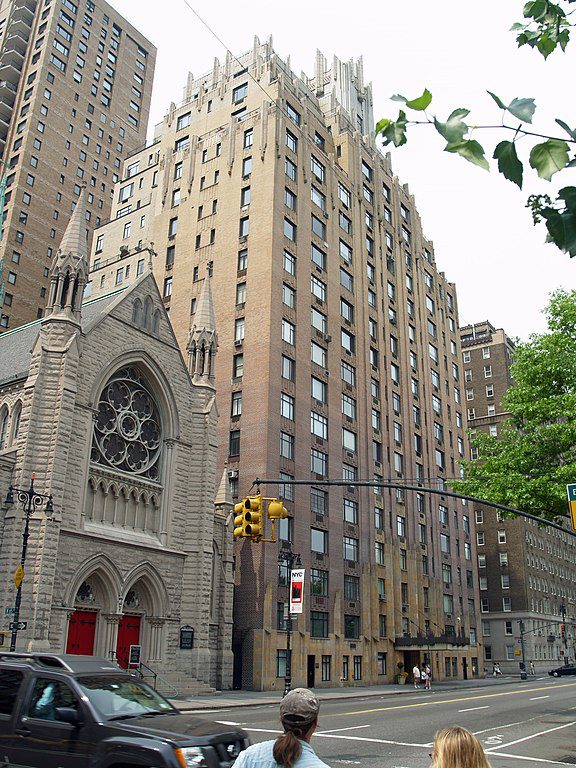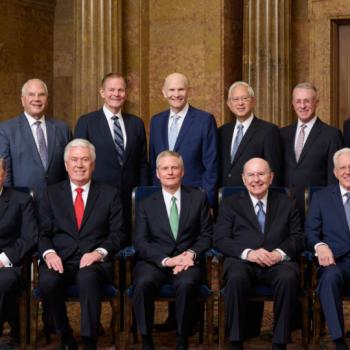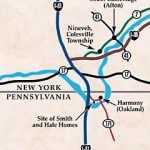
(Wikimedia Commons public domain image)
***
I recently read online that I’m burning with incandescent rage about the Hulu/FX miniseries Under the Banner of Heaven. Among other things, I learned that I’m beside myself with furious envy at its success. With that in mind — and scarcely able to see the keys on my computer for sheer blinding anger — I share Jim Bennett’s latest episode summary of Under the Banner. Probably sensing my desperately urgent need, he kindly granted me permission to share it here:
We open on a barren moonscape that is likely the non-existent town of East Rockwell, Utah, or Utah courtesy of Siberia. We then see a statue of Brigham Young, as Macaulay Culkin’s younger brother’s voiceover intones about ruin and devastation. The bearded Culkin, playing a fake Lafferty brother, attributes the quote to “John Taylor, President, Prophet, Seer, and Revelator, 1876.” Andrew Garfield is quick to correct him: “it’s ‘79, actually.” Take that!
Golly, Garfield’s Jeb Pyre is a walking encyclopedia of Church history, unless knowing something about Church history gets in the way of the plot. In a previous episode, he spoke of blood atonement as something that was “only heard in whispers” and is shocked to learn of its existence, but he talks about it ad nauseam in this episode in full voice, even using it as a verb: i.e. “blood-atoning” and “blood-atoned.” Curiously, everyone he mentions it to, even mainstream Mormons with no fundamentalist ties, knows exactly what he’s talking about.
So which is it? Is blood atonement a deep secret Mormon horcrux, or is it the subject of everyday Family Home Evening lessons where the bishop kidnaps your family? More on that later — I just employed a technique called “foreshadowing,” which is a storytelling device that hints of things to come. There are many methods of foreshadowing, but the filmmakers in this show only know one: droning, monotone bass notes that tell you everything that is coming is going to be bad.
Pyre does actual detective work and catches Culkin in a lie, proving he didn’t murder Brenda but instead is doing unspeakable things to squirrels. Were 1984 forensics capable of differentiating human blood from squirrel blood? And how many acorns do you get if you blood-atone rodents?
But the poor squirrels are quickly forgotten as Home Alone Jr. speaks a phrase that Pyre and his partner have never heard before – one that could blow this whole case wide open!
The phrase?
“School of the Prophets.”
At this utterance, everyone gasps, and the bass notes drone even harder than before. No one has ever heard this phrase! “Is it LDS?” asks Pyre’s Paiute partner. “No, it’s very specific,” Pyre answers, as if that’s somehow a logical reply to the question. (Pyre’s Paiute partner is named Lt. Talba, by the way, but I couldn’t resist the alliteration.) Throughout this episode, we learn that the idea of a “School of the Prophets” is nigh unto unthinkable! How can there be a School of the Prophets, plural? Prophets are like Sith Lords, Highlanders, and seasons of Firefly: there can be only one.
Now correct me if I’m wrong, but a guy who corrects someone when they’re wrong about the date of an obscure 19th Century John Taylor rant would surely know about the original School of the Prophets, formed in 1833 in Kirtland, Ohio. This was not something only spoken about in whispers during squirrel sacrifices. Several prominent sections of the Doctrine and Covenants describe its founding, its procedures, and, yes, its plural name. In the first episode, Pyre used the Doctrine and Covenants as an interrogation manual, quoting lengthy passages from memory. But now we are to assume he only memorized the beginning and stopped reading it altogether when he got about halfway through.
The stake president from the previous episode is still negotiating the release of murder suspects, which still makes as much sense as it did in the last episode, which is less than none. We later discover this is all part of an overarching plot by the Church to harass the police to cover up for murderers that they excommunicated. Because that makes sense, too, but only if you’re a mollusk.
Pyre brings the explosive non-bombshell of the School of the Prophets to the other fictional Lafferty in custody, worried that this abominable school will “unseat” the “One True Prophet, Spencer W. Kimball.” Because such a thing is an offense worse than murder in East Rockwell, punishable by listening to an endless loop of Jenny Oaks Baker CDs. Fake Lafferty II insists it’s just a study group where they doodle on PeeChee folders, but Pyre threatens to excommunicate him, which seems par for the course in a universe where stake presidents run the legal system. We then hear about “a man named Brady” who set the whole school up because of a “dream mine” and “Mormon gold” and a bearded guy named “Prophet Onias.” Oh, and he was busy with three boys of his own.
Alas, both fake Laffertys are still released into the SP’s custody, but before we can worry, we discover that the officer from the end of the last episode found Bishop Lowe and his wife, so the cops bolt out the door to stock footage of the real Utah Valley, which has undergone a massive construction boom in the time since the shot of the moonscape from the start of the episode.
As Pyre and Talba arrive at the Lowe home, the cop who found the Lowes inappropriately bears his testimony to Pyre on the way in, attributing all success to Heavenly Father. This earns a pained losing-my-religion smile from Pyre, who dares to remind this zealot that he deserves the credit for finding the Lowes, not Heavenly Father, because he “followed the evidence, like a good cop does.” Officer Zealot visibly flinches in the presence of Pyre’s vile blasphemy. Or maybe he’s just passing gas.
The interrogation of the animatronic bishop/wife team begins, and these robots glumly spew Church jargon and, after stiffly invoking the “confidence between a bishop and his fold” as a “sacred trust,” violate that confidence at the earliest possible opportunity, unloading all the details of why both Lafferty brothers are excommunicated. (The real Laffertys were excommunicated two years before the murders, but in this universe, nobody notices until now.) We then cut to Matilda Lafferty milking her cow, which naturally leads to a moment of butter churning, because Mormons are Amish and stuff.
May I say, however, that this next scene is likely the best scene in the entire series to this point.
Matilda walks in on her husband in bed with Matilda’s teenage daughter, and Dan calmly and quietly explains that they are now going to be polygamists, which causes Matilda to recoil in horror. He does this without ranting like a lunatic, and she responds with credible and heartbreaking emotional honesty. And for one brief, shining moment, this show achieves a verisimilitude that it has been aiming for since Episode One and has missed by a mile until now. It’s genuinely unsettling, and it feels like something that could have really happened and continues to happen whenever polygamy is practiced. Although I could have done without the line where Dan says that “God has given me a vigorous sexual spirit.” Um, ick.
Matilda, who is possibly the most fully realized female role in the series, sends her children away to escape in the dead of night, and she seduces her husband to keep him from going to investigate. And just like that, the interesting part is over. We’re back to the bishop android, who tells Detective Pyre that the kids ran right to him, so he took it upon himself to put them in a “very good home” without involving anyone with the legal authority to put kids in other people’s homes. And then the kids “ran away” from their new home and are missing, so Pyre and Talba arrest the reckless bishop for child endangerment and kidnapping. Ha ha! If only! No, they just wring their hands and give him a good scolding so he’ll think twice about misplacing children in the future.
Pyre then asks about Ron’s excommunication, and Bishop Roboto stiffly exposits that “these issues came to a head at the naming ceremony of Baby Erica.” Real people call such things “blessings,” but “naming ceremony” sounds significantly culty-er, so we’re going to run with that. After the Ceremonial Naming™, Ron confronts the bishop in the front of the chapel and asks him about his brother’s ex-ing, and the bishop feigns fealty to confidentiality before once again violating it. He confirms that Dan was excommunicated for his “studies” and tells Ron that there is “nothing of value to be learned” in reviewing Church history, which really puts the billions of dollars the Church spends on education in perspective. See, we are apparently supposed to be “humble in the face of confusion” as we inevitably discover that everything the Church teaches is laughable nonsense. The only good Mormon is a stupid Mormon.
Ron shoves the bishop and says “You think that he was going to get closer to the Eternal Father than you?” (That’s how you say “You think you’re better than me?” in Utah Kennedese.) This happens in clear view of a large chunk of the congregation milling about in the chapel, and nobody cares. We get a quick scene with Brenda, the ostensible subject of this series, who was all but absent from the last episode and gets less than a minute of screen time in this one. She shows up to repeat today’s secret word: “EXCOMMUNICATE.” This word is spoken in this episode 87,433 times, give or take.
The bishop’s wife then stepfordly counsels Brenda that when she’s in a man’s presence, she is to “sit down and shut up.” Or, in UTBOH-speak, “These solutions are not our role. Our job is to dedicate ourselves to . . .” and then she trails off to allow Diana Lafferty to finish the Mormon Mother’s Mantra: “. . . to creating a home and environment to sustain and support our priesthood holder.” She rattles this off as if it’s some warped version of the Handmaid’s Pledge of Allegiance that all Mormon girls memorize when they are six years old. The bishop’s creepy wife nods approvingly as she gets every word right.
Back in the present, Detective Talba says that this mantra may not be the best advice to give someone living in a home with a threat of violence, which is outrageously and offensively reasonable. The indignant bishop therefore refuses to respond to him directly and speaks to Andrew Garfield instead. “I did as the Church instructed us to do, Brother Pyre,” he says, pretending the uppity Lamanite isn’t even in the room.
The detectives discover the location of the man named Brady, who lives in a house up in the hills, which is “closer to the Lord, they say.” The Bradys are cheerful buffoons who say “gosh” and “heck” and “dang” a lot as they introduce the detectives to — no joke — the “whole Brady brood.” (I mean, come ON.) Detective Talba brandishes a search warrant, and they proceed not to search for anything. They have a cheerful conversation wherein it becomes clear that Mrs. Brady is a useful idiot who wouldn’t dare speak to Brother Brady about anything substantial. Of course, they both know all the confidential details of Ron Lafferty’s church court, because in this universe, such things are likely posted in the ward newsletter.
We get a quick flashback where Ron hisses at his wife for not being a doormat to his priesthood and then punches her in the face. “You will submit WILLINGLY,” he snarls, “or I will STARVE you into obedience!” He then throws a lot of eggs on the floor, perhaps as a metaphor for how his yolk is easy and his burden is light.
Diana then gets a knife and kicks Ron out of the house, and he slinks off to the sound of ominous bass notes. He apparently made a beeline to the Brady house, and Mr. Brady tells the detectives that they made up for Ron’s felony violence with lots of scripture study. “These guys will read anything just to get out of hosing my gutters,” Mrs. Brady says with a smile, leaving us to wonder if “hosing my gutters” was a deliberate “that’s what she said” cue.
Anyway, while Mrs. Brady is in the room, they pleasantly reminisce about the camaraderie of this nifty little study group that ensued, which included a stinky “eccentric” named Onias who was “not a fan of bathing.” Mr. Brady tells his wife to “get some lemonade for these hardworking boys.” As soon as she’s gone, the detectives speak to Mr. Brady as if he’s an adult, and Talba calls Brady “doughy.” Ouch! They get him to squirmingly admit that his School of the Prophets included a lot of talk about the “old ways,” i.e. polygamy. “Don’t tell my wife,” he pleads, as if he’s asking them not to spill the beans about the flowers he bought her for Valentine’s Day.
Brady apparently sent himself a letter documenting how the School of the Prophets was compiling a list of names of people who would suffer “eternal consequences,” but the letter doesn’t identify any specific names. The cops want specific names, and when they mention Diana, Brady casually says that “she wouldn’t be the first woman to dash off something she had no right to and have it lead to bloodshed.” Oh, yeah, tell me about it. That’s a typical Thursday in East Rockwell.
No, what it is is an opportunity to give us the first historical flashback of the evening. “Brother,” Brady begins, “our greatest loss can be traced to words written by a wife who thought she knew better than her husband.” Quite the seamless segue there.
“No, we’re not going there,” Pyre says, but, alas, we go there. And “there” is to a truly loopy scenario where, near as I can tell, Emma Smith is directly manipulated by Brigham Young into killing her husband. And the “letter” she writes isn’t actually written — it’s a verbal message she gives to Cotton-Eye Joe to deliver orally, telling Joseph to come home and face justice. Joseph dutifully complies and is consequently assassinated.
Everything about this scenario is ludicrous in the extreme. The real Emma demonstrably loved her husband and didn’t want him dead, and she hated Brigham and would never wittingly or unwittingly conspire with him to kill Joseph. Brigham was also on a mission when all this went down and didn’t have the access to put the murder wheels into motion. No actual letter was written, so they invent this “unwritten” oral message of which there is no record, but somehow Laffertys and doughy Bradys know it word-for-word 150 years later. According to UTBOH, this flimsy, ludicrous, evidence-free conspiracy is the foundational sin of Mormon violence that continues to breed dangerous men well unto this day. So there.
Mrs. Brady interrupts History Time bearing lemonade made with brown sugar, which sounds gross. Mr. Brady acts like he’s going to go hang out with “these fine men” of his own free will and choice, and Pyre says “we’ll get him back to you faster than you can say ‘Lamanite’ three times fast.” Groan cringe blech. Speaking of three times fast, I’m already at 2,500 words, and I’m only halfway through the episode. I better speed it up.
Anyway, they go investigate, we get a bunch of MTV-cut flashbacks, including one where Pyre is inexplicably standing in an empty temple wearing his detective clothes. Pyre goes home to an empty house, so he pulls a gun, not assuming that maybe his family has gone to McDonald’s or something. Ominous music builds until he finds the scary, scary note that they’ve gone to the bishop’s house. They decide to do a sleepover with the bishop, which is not something that anyone does, and Talba later assumes that the slumber party is the Church trying to put a stop to the investigation of people they have excommunicated, which is also not something that actually happens.
A flashback tells us that Ron was excommunicated by the local Star Chamber, so he goes home and terrorizes his children to celebrate. The cops go to the farm where the School of the Prophets is held and find teenage girls being trafficked for polygamists. On the way back from their creepy field trip, Alan Lafferty talks about Ron going home to his parents. Papa Lafferty is dying, and Ron refuses to get him a doctor because Mormons are Christian Scientists as well as Amish. His mother, the spiritual sister of Sissy Spacek’s mom in Carrie, tells him he’s passed all of the Lord’s tests and that he’s the One Mighty and Strong. Then Joseph Smith gets killed, because it’s all connected and stuff. The end.
I wish.
Shared with seething wrath from New York City











